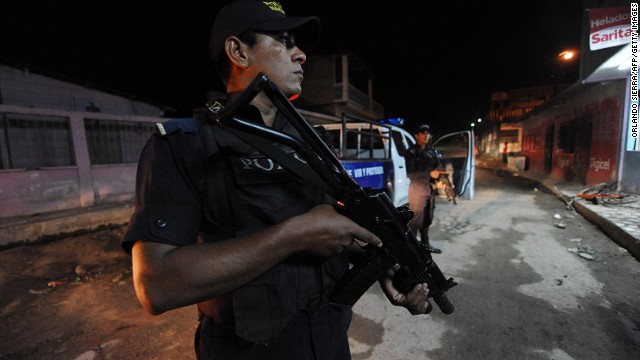March 28, 2013 -- Updated 1607 GMT (0007 HKT)

Living in the world's murder capital
STORY HIGHLIGHTS
- San Pedro Sula, Honduras, named murder capital of world for second straight year
- Acapulco and Caracas come second and third, respectively, in Mexican think tank report
- Residents say "murder capital of the world" label is hurting business and is undeserved
- Honduras university says murder rate in San Pedro Sula actually higher than reported
But the soldiers are too
late to prevent the grisly scene that awaits them. One of their own is
on the ground, seriously wounded. One of the attackers is dead, and
three others have been shot.
"They didn't even say a
word. They just pulled out their weapons and started shooting at our
soldiers," army commander Carlos Rolando Discua said of the scene, which
has become all too familiar in Honduras' second-largest city.
Discua oversees a unit of
soldiers, often masked to protect their identities, who patrol the
streets of San Pedro Sula, the so-called murder capital of the world.
For the second straight year, San Pedro Sula, in northwest Honduras, has topped a list of the world's 50 most violent cities, with a rate of 169 intentional homicides per 100,000 inhabitants -- an average of more than three people every day.
The report, compiled by the Mexican think tank Citizen Council for Public Security, Justice and Peace, compared intentional homicide statistics around the world in 2012. The report does not include cities in the Middle East.
The sunny beach resort of Acapulco in Mexico ranked second on the group's list, followed by the Venezuelan capital of Caracas.
New Orleans is the murder
capital of the United States, according to the report, which ranked the
city 17th on the list. Detroit, St. Louis, Baltimore and Oakland were
the other U.S. cities to make the list.
San Pedro Sula's
challenge, experts say, is that Mexico's offensive against drug cartels
and the active U.S. deportation of criminal immigrants are pushing the
problem south. Some of this criminal element has ended up in Honduras,
where, like most Central American countries, law enforcement has few
resources to fight it.
But city residents say that "murder capital of the world" is an undeserved label that is hurting local businesses.
There are only three
morgues in Honduras, and one of them is in San Pedro Sula. Residents say
that people who are murdered elsewhere and then taken to the city's
morgue are being grouped into the city's crime statistics.
"All of the crimes that
happen in northern Honduras are registered as happening here,"
businessman Luis Larach said. "So what we businessmen are doing is an
accurate count to determine where crime or violent deaths originate so
that the information is truthful."
The National Autonomous
University of Honduras said that only people murdered in San Pedro Sula
were tallied in the group's report -- and that in fact the actual murder
rate in the city is even higher.
The authors of the
report defended their research on the group's website, writing: It "is
not the ranking that damages the image of the city but the violence and
the government's inability to contain and reduce it. To hide the
problems never solves them."
Honduras is far from the
only country in the region with a murder problem. The top 10 -- and 39
of 50 overall -- most violent cities on the list are Latin American.
Authorities have
launched Operation Lightning in San Pedro Sula, saturating violence
hotspots with police and soldiers, and some residents believe the
beefed-up security is working.
"There's more security now," said local resident Nicolle Valladares. "And that gives us peace."
Unfortunately, at least so far, the measures seem to have had little impact on the murder rate.
Journalist Elvin Sandoval in San Pedro Sula, Honduras, and CNN's Laura Perez Maestro in London contributed to this report.

No comments:
Post a Comment